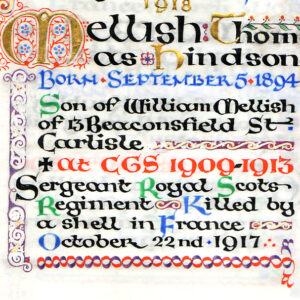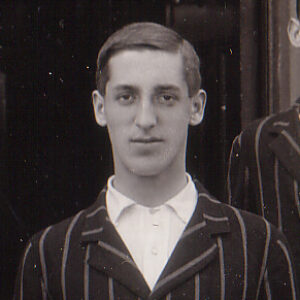Shortly after the outbreak of war, Thomas volunteered for service with the Argyll and Sutherland Highlanders and was transferred to the Royal Scots in September 1917. His military history sheet from 1916 shows he received instruction in York and qualified in muskets, physical drill, bayonet training, squad drill and rifle exercises.
On the night of 20/21 October 1917 the 16th Battalion Royal Scots was in the Salient as part of the 3rd Battle of Ypres known as Passchendaele. They went into the front line just to the north of Poelcapelle “After the usual dreary sojourn in the depressing camps near Ypres” and were “buffeted by shell fire on the way”. The attack was to be launched on the 22nd at 5.35am, the 15th and 16th Royal Scots being the leading battalions but Ewing argues the task given them waqs “difficult and complicated.” Ewing continues: “The water-logged nature of the country rendered the punctual assembly of the troops a very anxious business. The men could scarcely drag themselves through the mud, and the Boches added to their misery by putting down a savage barrage along the assembly positions, causing many casualties and throwing the troops into confusion. But the excellent leadership of the officers and NCOs and the discipline of the men triumphed.”
Captain Sutherland wrote to Thomas’ father: “Your son was hit by a piece of shell about 1am, a few hours previous to moving into a position for attack. I had him taken into an old German ‘pill-box’ and attended to as best we could, but he was rendered unconscious from the first. About midday on the 22nd I myself got back wounded to the same ‘pill-box’ and was told that Sergeant Mellish had just died. I had a very high opinion of your son, and he was held in the highest esteem by the officers and men of his company. He was my most reliable N.C.O. and I noticed that his moral qualities had a great effect upon his men.” The Cumberland News also reported that of 25 Carlisle teachers who had volunteered for service: “Sergeant Mellish is the first to pay the supreme sacrifice for the defence of those at home.” The news of his death was greeted with great sorrow by the staff and students at Ashley School: “with whom his fine personal qualities made him very popular” and the school flag was displayed at half-mast. An unofficial account of his death was accepted so 22 October was registered as the official date of death. However Carlisle Grammar School Memorial Register lists his death as having occurred on October 21. His possessions were listed as discs, letters, photos in case, pen, cards, note case, mirror, watch, knife, belt, purse, diary, religious book.
Thomas is commemorated at Tyne Cot.


